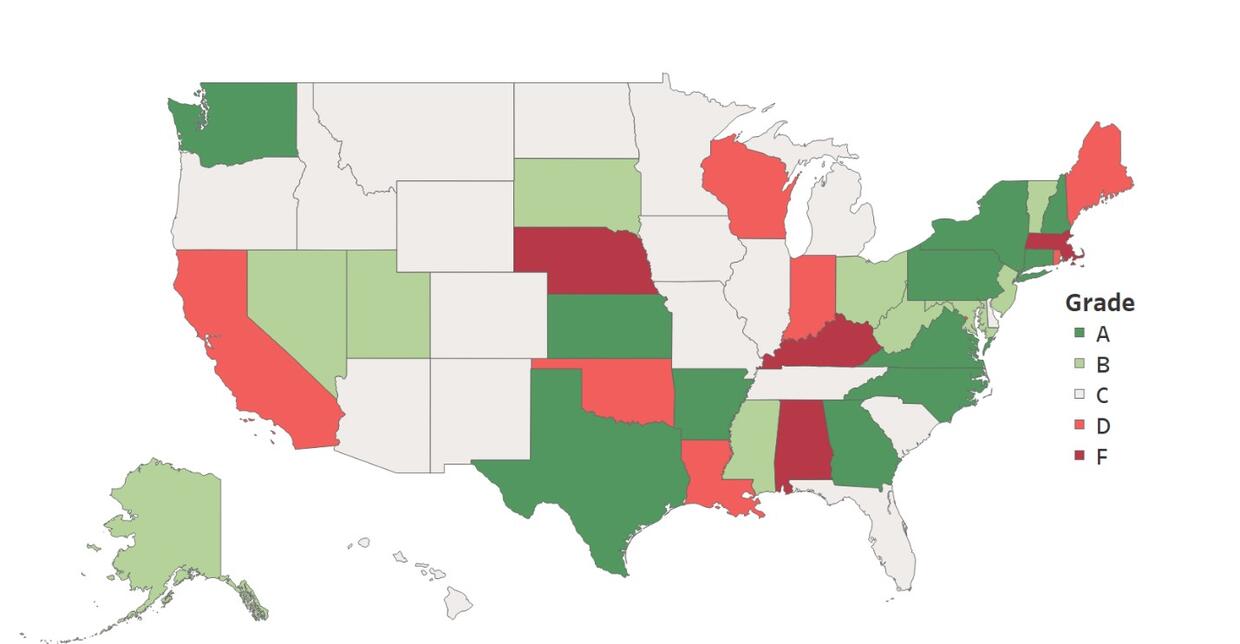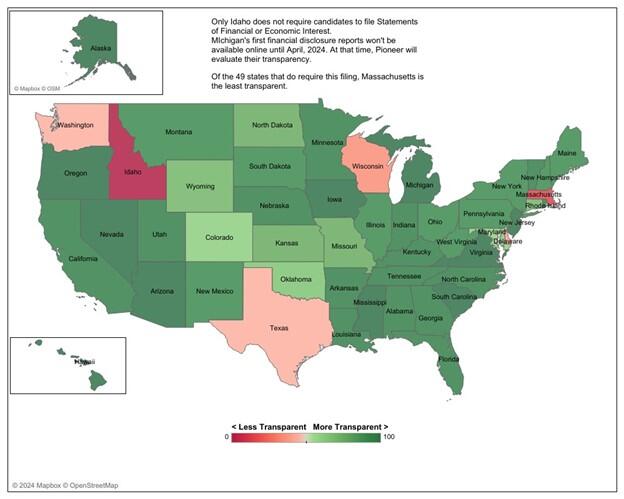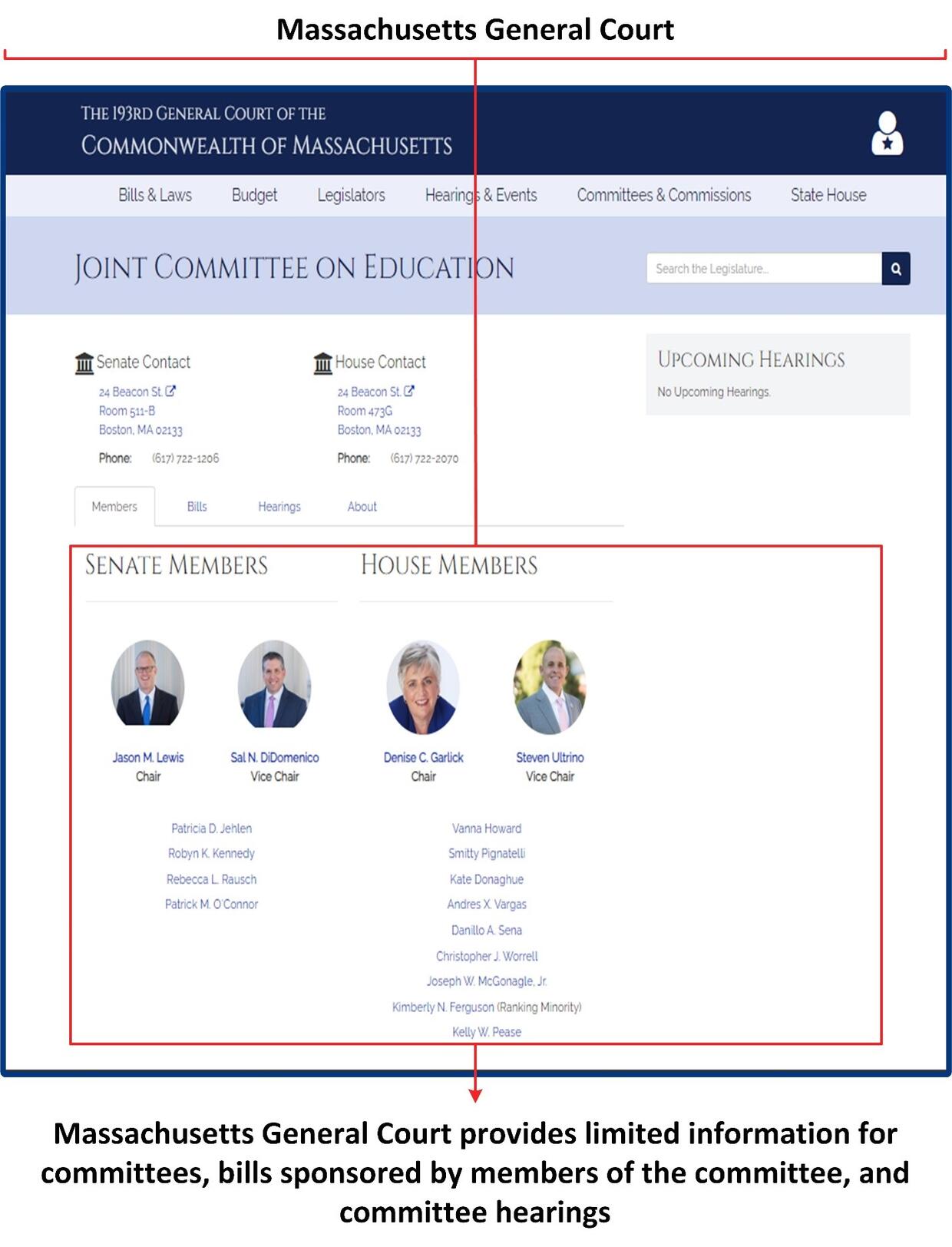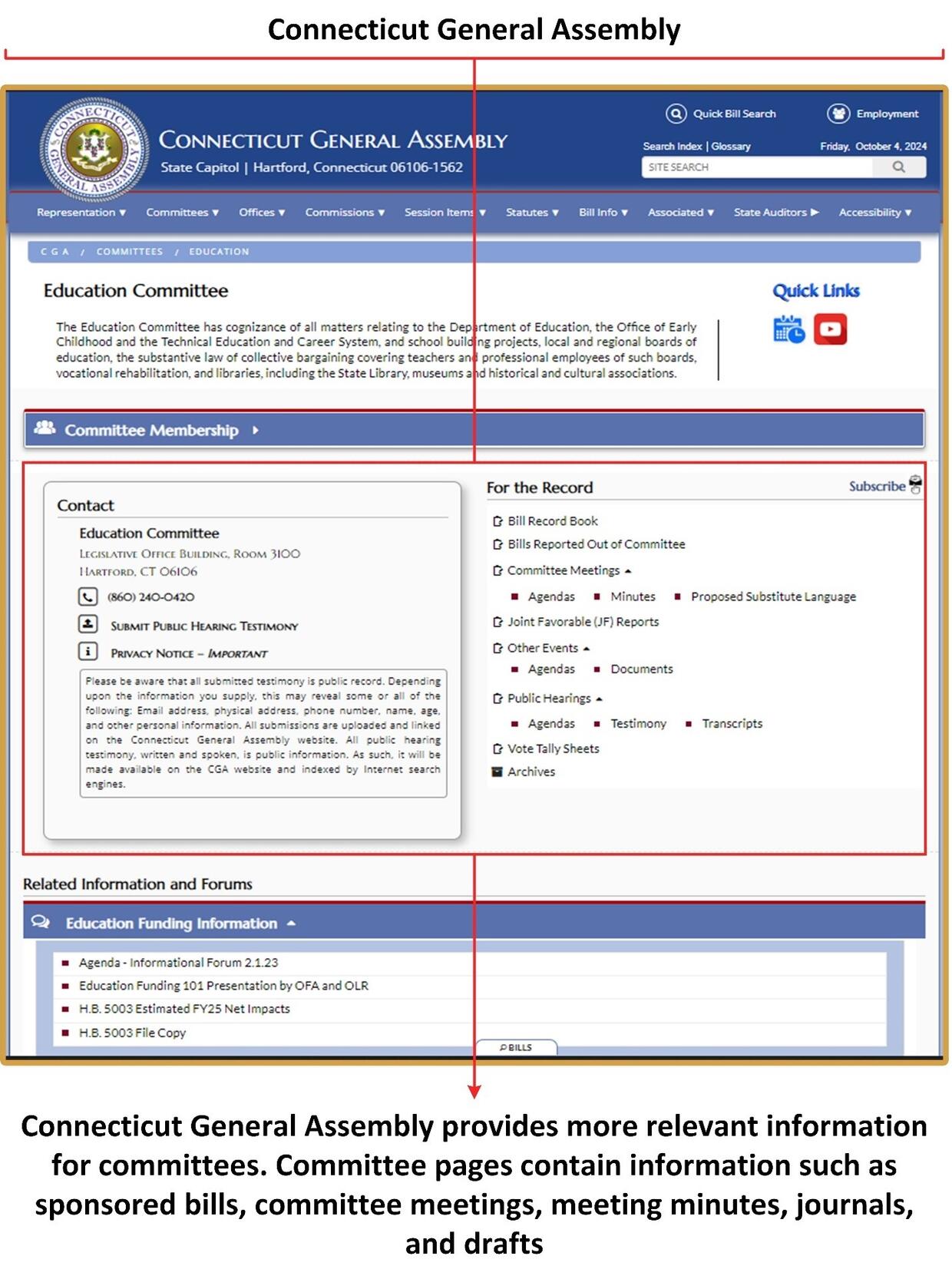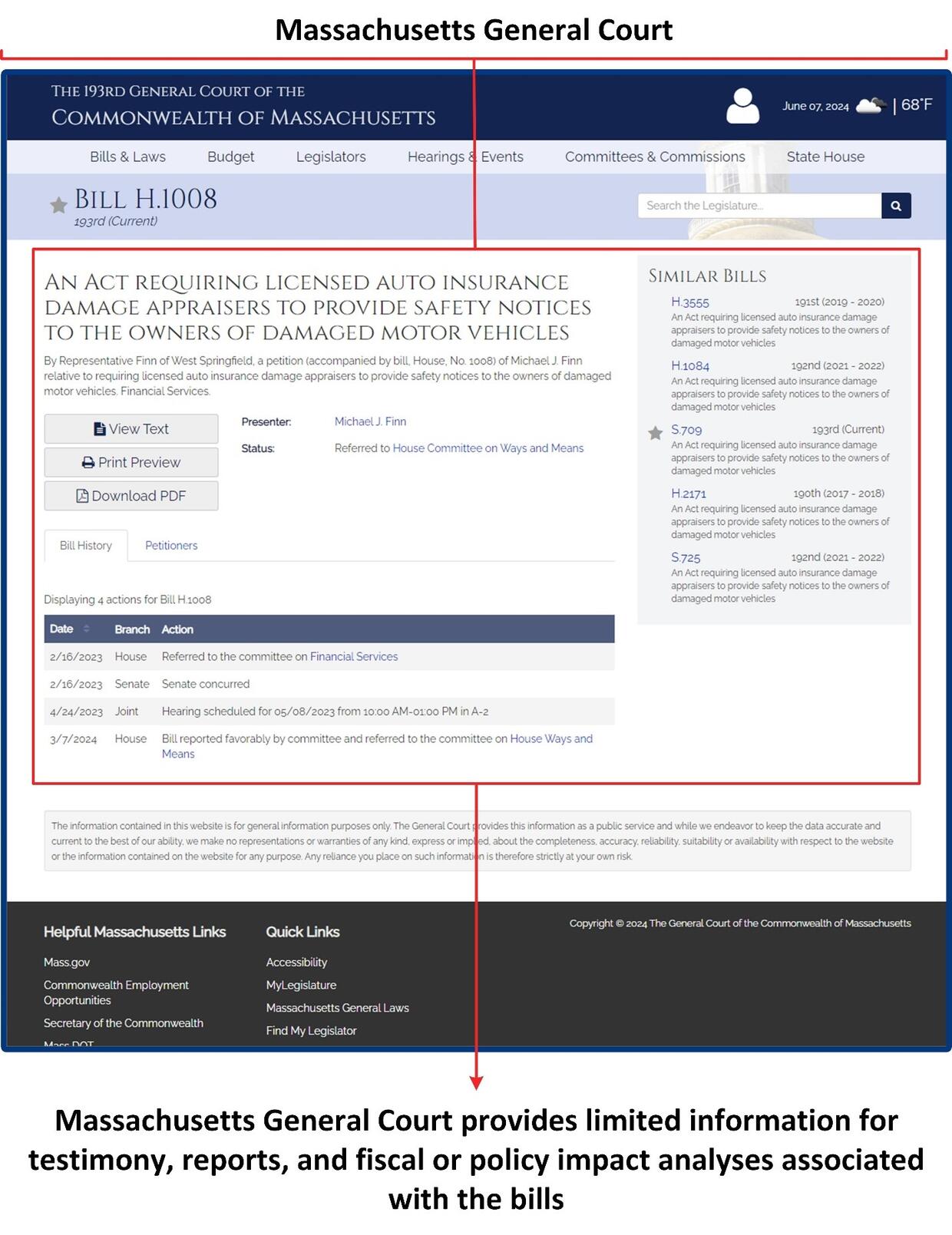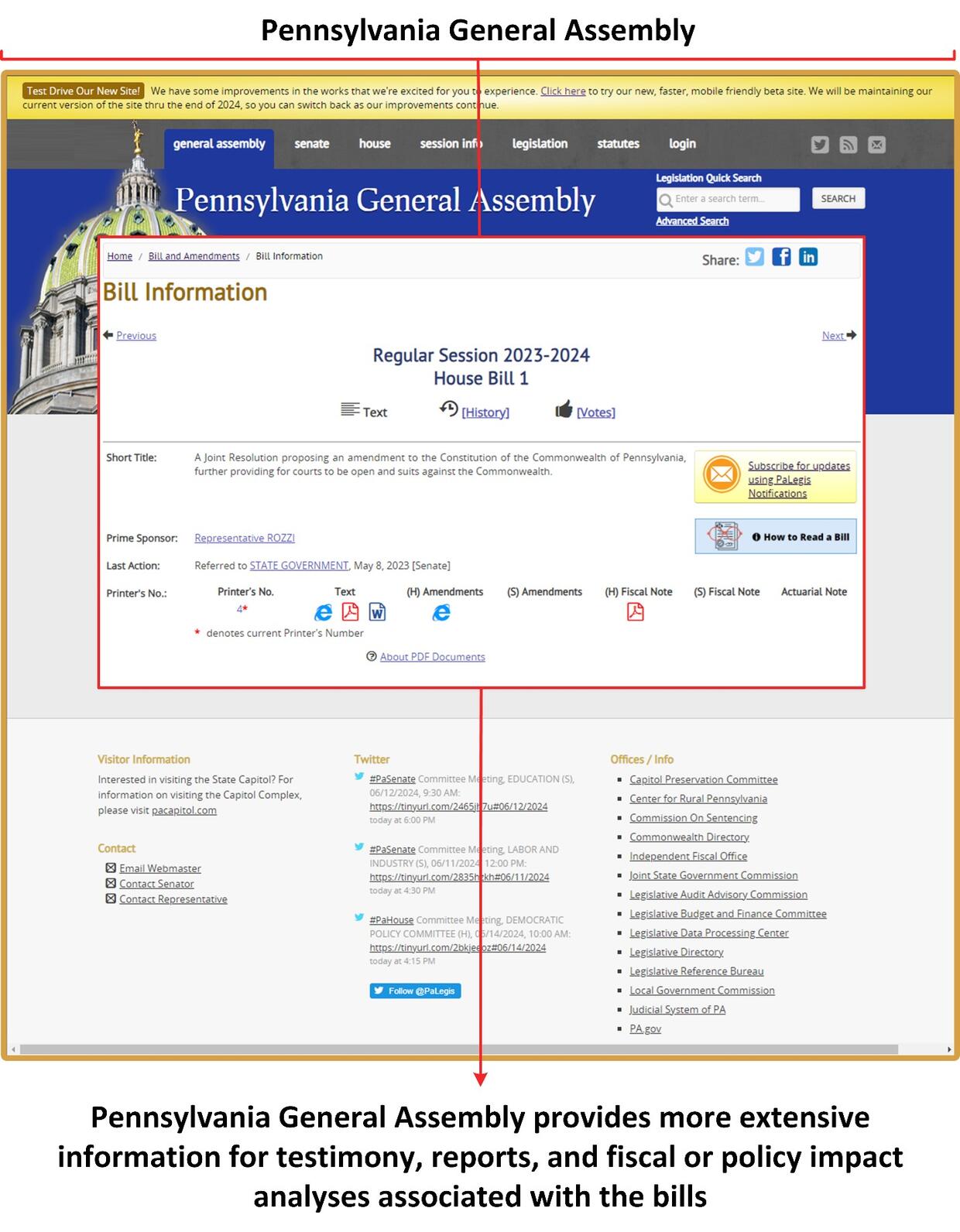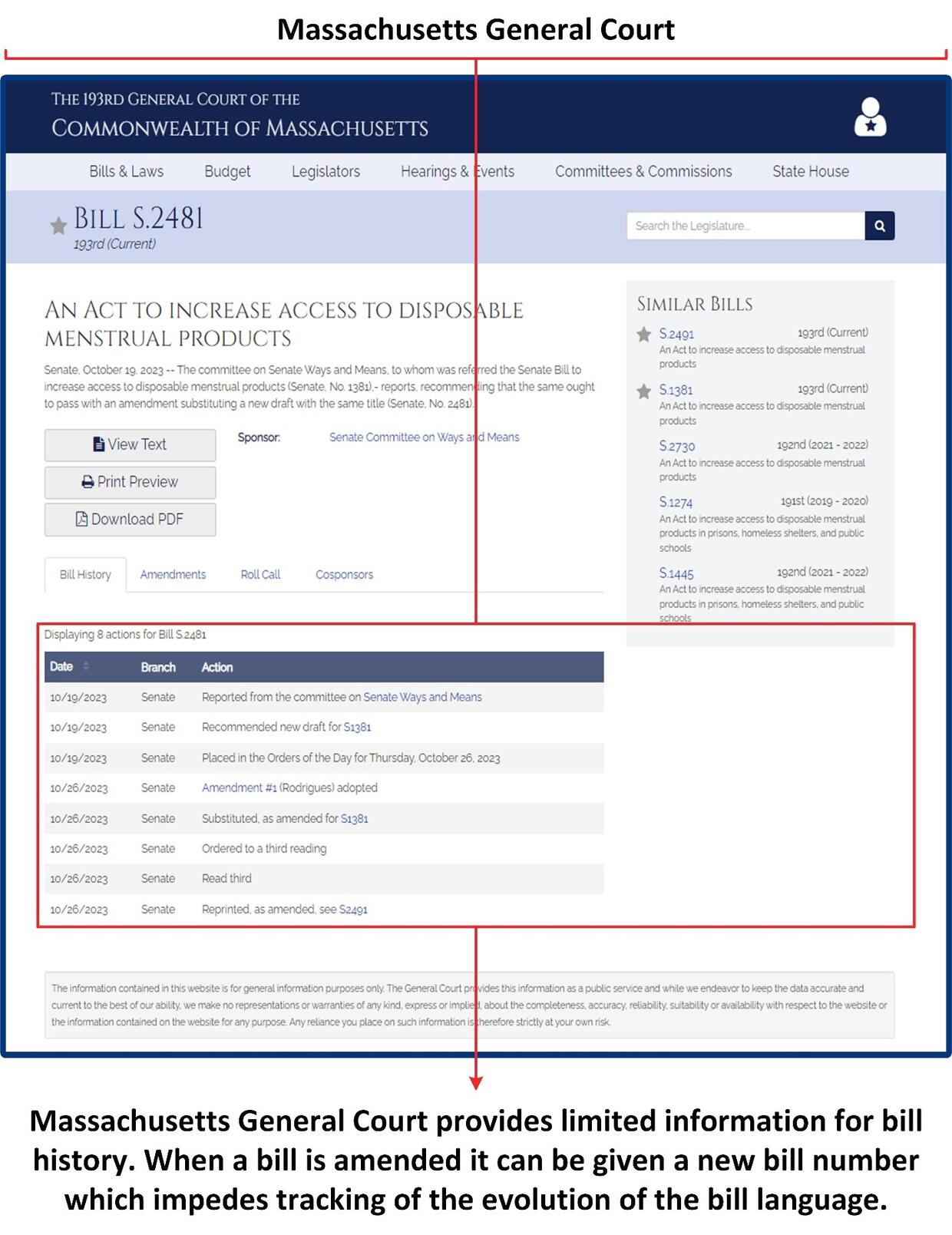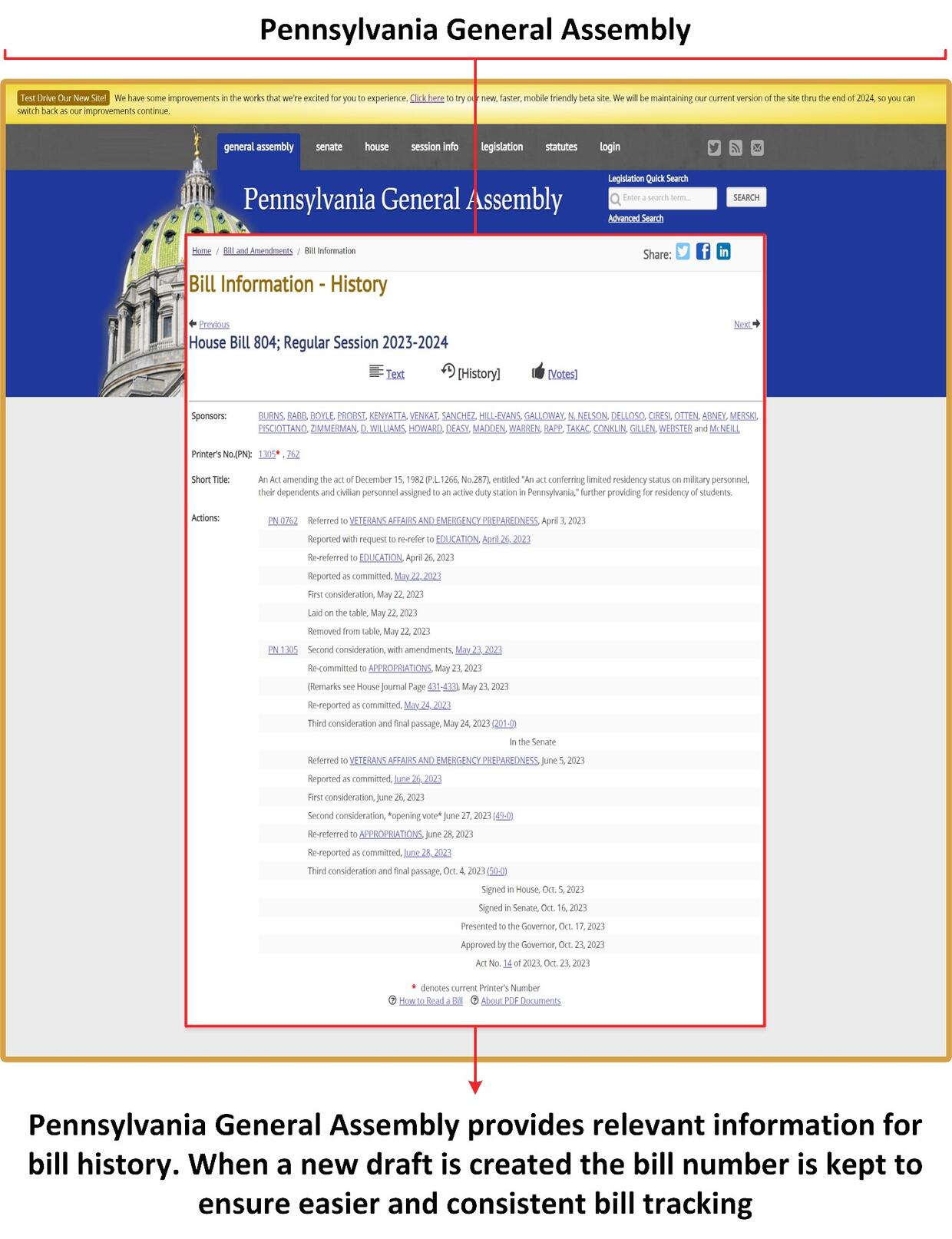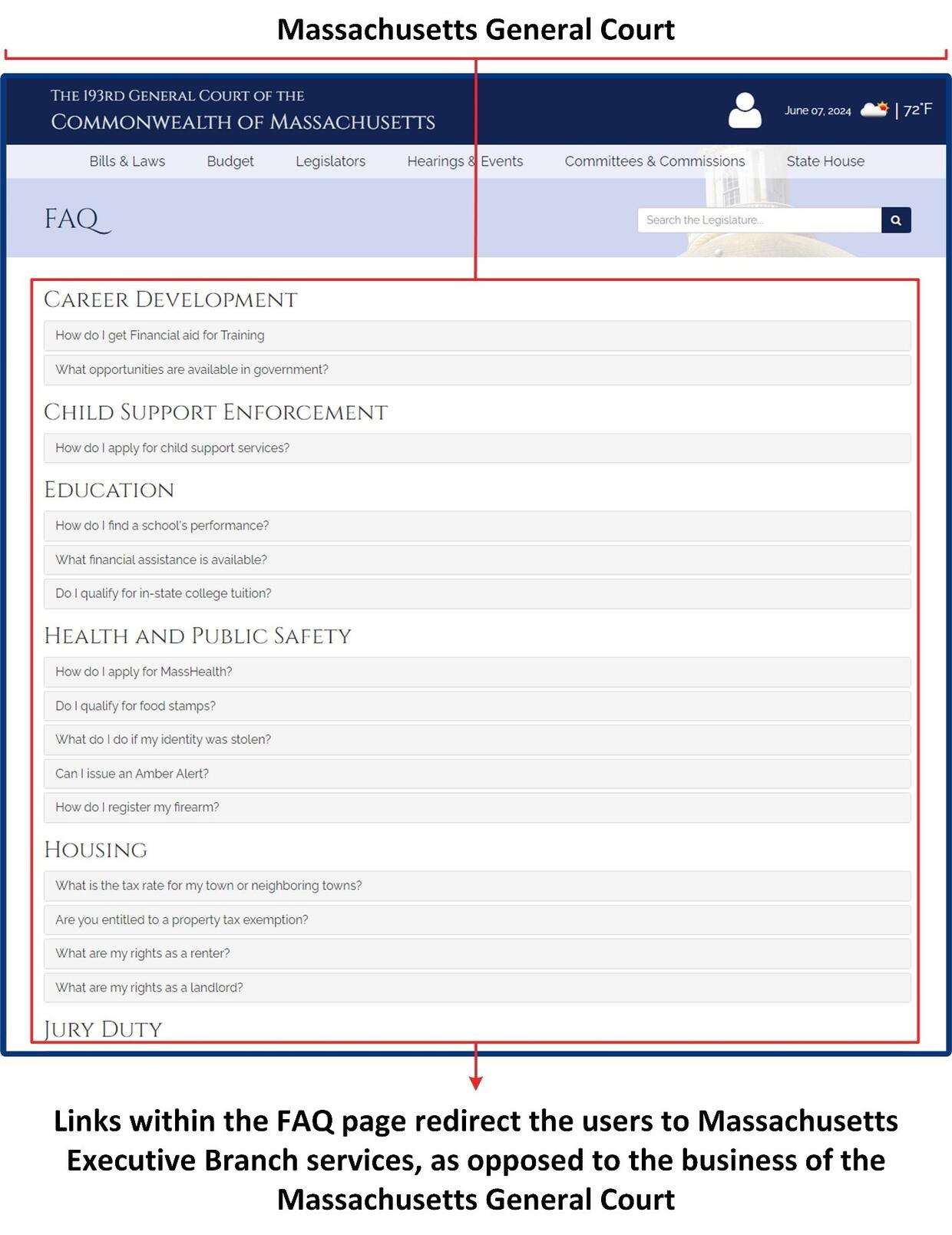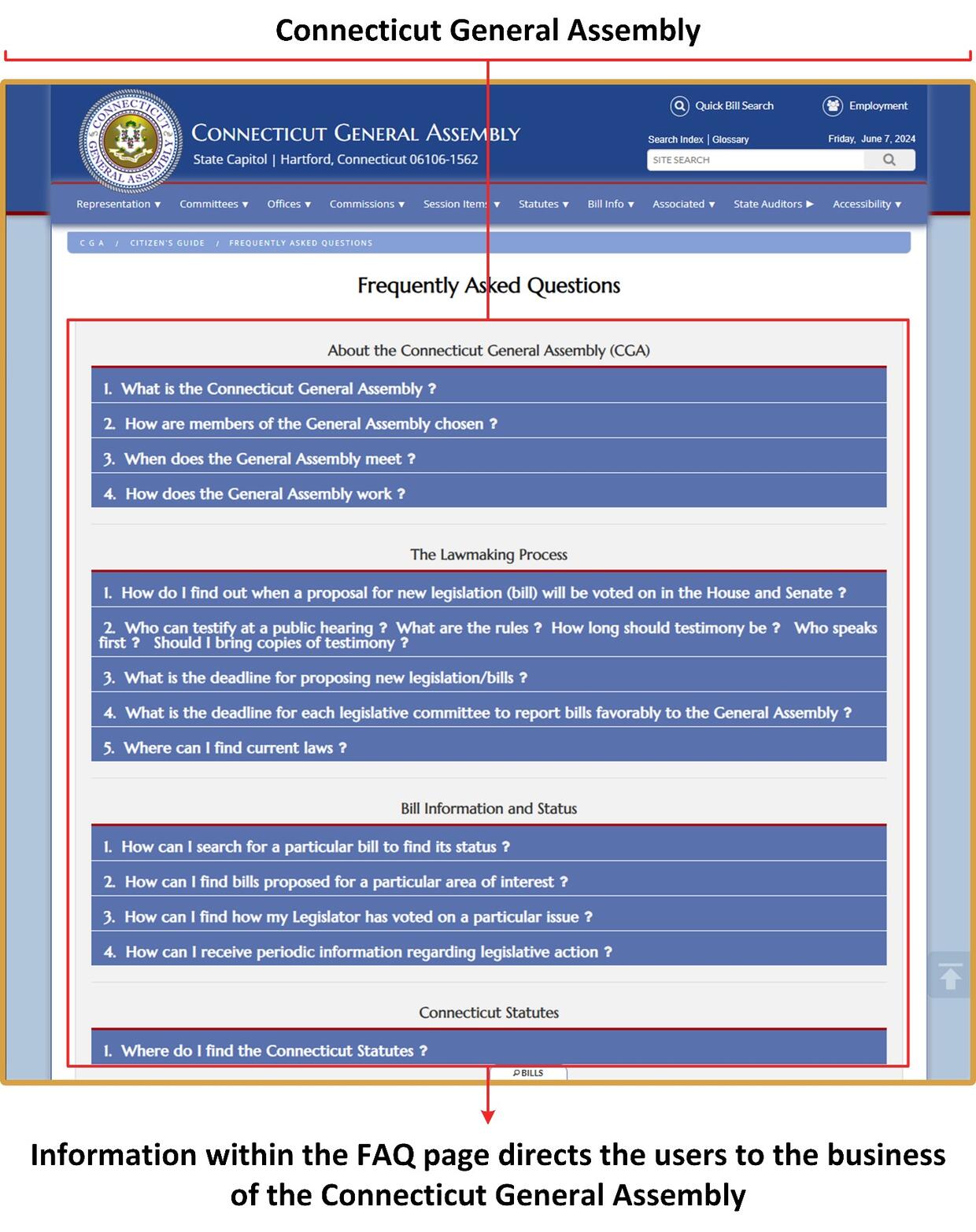Overview
To determine whether and to what extent the Massachusetts General Court is communicating information regarding pending and enacted legislation to the public, we reviewed the Massachusetts General Court website to assess the extent of available information regarding the legislative process, and pending and enacted legislation, as well as the ease of website navigation. We then compared these elements to those of the sample states—Kentucky, Pennsylvania, Virginia, Connecticut, and Oregon (see Appendix B). During our review, we found that, in comparison to the legislative websites of the sample states, the Massachusetts General Court website lacks apparent content and ease of website navigation regarding pending and enacted legislation. More specifically, we found that in comparison to the sample state legislative websites, the Massachusetts General Court website, and the homepage in particular, provides insufficient information, and has a less intuitive structure of information on committees, Massachusetts General Court proceedings, and the overall legislative process, as well as less intuitive website navigation68 to the information and records that are available. These issues are described in further detail in our sub-findings below. If the Massachusetts General Court does not improve its website to increase content and ease of website navigation regarding pending and enacted legislation, then it limits the public’s ability to understand and engage in the legislative process and hold the Legislature accountable for ensuring an equitable mode of making laws.
Before discussing the sub-findings, we note that Massachusetts has been generally ranked as less transparent than other states regarding legislative information. According to its website, Open States69 “aggregates legislative information from all 50 states, Washington, D.C., Puerto Rico, and US Congress.” On March 11, 2013, Open States published an Open Legislative Data Report Card that evaluated states on transparency of publicly available data using the following six criteria: completeness, timeliness, ease of access, machine readability, use of commonly owned standards, and permanence.70 Open States converted qualitative data to numeric scores and coinciding letter grades.71 Massachusetts was one of four states to ultimately receive an “F” grade, the lowest grade possible.72 There were 11 states that received an “A” grade in the final report card, including 3 of our sample states—Connecticut, Pennsylvania, and Virginia. We developed the map below using data from the Open Legislative Data Report Card.73
Another assessment by the Pioneer Institute for Public Policy Research ranked the states on financial transparency.74 According to the Pioneer Institute, of the 49 states requiring financial interest disclosure reports in 2024, Massachusetts ranked as the least transparent.75
Source: The Pioneer Institute
a. In comparison to the sample state legislative websites, the Massachusetts General Court website provides less apparent information and records regarding committees and committee proceedings, and less intuitive website navigation to the information and records that are available.
During our review of the Massachusetts General Court website, we found that, in comparison to the legislative websites of the sample states—Kentucky, Pennsylvania, Virginia, Connecticut, and Oregon—the Massachusetts General Court website provides significantly less detailed information on committees and committee proceedings, and less intuitive website navigation to the information and records that are available. According to the Massachusetts General Court's Rules, specific committees are intended to help determine legislative proceedings and initiate legislation that appears before the Massachusetts General Court for consideration. A lack of apparent information and records regarding committees and committee proceedings, combined with less intuitive website navigation, contributes to a lack of transparency concerning pending and enacted legislation. This limits the public’s ability to understand and engage in the legislative process and hold the Legislature accountable for ensuring an equitable mode of making laws.
Although the Massachusetts General Court website and the sample state legislative websites all provide hyperlinks to their committees, either in their homepage toolbars or as first-degree hyperlinks or tabs from their toolbar hyperlinks, the extent of the resulting information when following the website breadcrumbs76 differs significantly.77 Navigating within the Massachusetts General Court website, the Committees & Commissions toolbar hyperlink leads to the various legislative committees of the current session, descriptions of committee jurisdiction, members, bills, hearings calendar, bill history, amendments, and videos of hearings, if available.78 In addition to the foregoing, the Kentucky General Assembly website’s Committees hyperlink leads to lists of committee staff, meeting materials, and prior years’ information.79 The resulting bill hyperlinks from the meeting materials lead to documentation regarding a bill’s original presentation, final presentation, summary, fiscal impact statement(s), amendment(s) with changes tracked against the bill, amendment summary, and vote history.80 The Pennsylvania General Assembly website’s Senate and House hyperlinks similarly lead to committee information, including prior years’ information, meeting materials, bill and amendment text in various formats, fiscal notes, and vote history.81 The Virginia General Assembly website’s Members and Session hyperlink also leads to more committee information than the Massachusetts General Court website, including hyperlinks to committee staff with contact information, bill summaries, bill and amendment text with tracked changes, impact statements, and vote history.82 The Connecticut General Assembly website and Oregon State Legislature website continue this trend.83 See the followingfigures.84 The Massachusetts General Court’s deficit in committee records and lack of clear navigation undermines the transparency of legislative processes in Massachusetts.
Authoritative Guidance
Pursuant to Paragraph 8.18(h) of the 2018 Yellow Book, an example of acceptable performance audit criteria includes “benchmarks against which performance is compared, including performance of other entities or sectors.” As such, best practices emerging from the review of the legislative websites of the sample states include the following:
- information and records regarding committees and committee proceedings, such as sponsored bills, committee meetings, meeting minutes, journals, and drafts, that are available to the public on the website; and
- intuitive website navigation to the information and records that are available to the public on the website.
The Declaration of the Rights of the Inhabitants of the Commonwealth of Massachusetts in the Massachusetts Constitution states the following in part:
All power residing originally in the people, and being derived from them, the several magistrates and officers of government, vested with authority, whether legislative, executive, or judicial, are their substitutes and agents, and are at all times accountable to them.85
Reason for Issue
The Legislature refused to participate in this audit; therefore, we were unable to obtain a reason why the Massachusetts General Court website provides less apparent information and records regarding committees and committee proceedings, and less intuitive website navigation to the information and records that are available, in comparison to the sample states.
b. In comparison to the sample state legislative websites, the Massachusetts General Court website provides less apparent information and records regarding pending and enacted bills, and less intuitive website navigation to the information and records that are available.
During our review of the Massachusetts General Court website, we found that, in comparison to the legislative websites of the sample states—Kentucky, Pennsylvania, Virginia, Connecticut, and Oregon—the Massachusetts General Court website provides limited content and is more difficult to navigate when it comes to information and records regarding pending and enacted bills. As discussed above regarding committees and committee proceedings, the extent of additional information accompanying bills associated with committee hyperlinks is noticeably greater on the sample state legislative websites, including easily accessible bill summaries, amendments with summaries and tracked changes, impact statements, and vote history. A lack of apparent information and records regarding pending and enacted bills, combined with less intuitive website navigation on the Massachusetts General Court website, contributes to the lack of transparency and limits the public’s ability to hold the Legislature accountable for ensuring an equitable mode of making laws.
The Massachusetts General Court website provides a hyperlink (Bills & Laws) on its homepage, as do the websites of the Kentucky General Assembly (Bills), Pennsylvania General Assembly (Legislation), Connecticut General Assembly (Bill Info), and Oregon State Legislature (Bills and Laws). The Virginia General Assembly provides a banner hyperlink called Click for Bill Tracking, Meetings, Who’s My Legislator? at the top of its homepage, to access the “most requested information quickly, all in one place.”86 However, the Massachusetts General Court website’s corresponding hyperlink (Bills & Laws) leads to the same limited presentation of bill information as Committee hyperlinks—bill text, amendment text, bill history, and identity of petitioners. In comparison, the Pennsylvania General Assembly website’s corresponding hyperlink (Legislation) leads to more robust bill information that includes summaries and fiscal notes. See the following figures.87
Moreover, the bill history that is provided by the Massachusetts General Court website is limited when compared to the sample state legislative websites. It is more difficult to follow as the text of amendment language is provided but not tracked against the relevant bill. When changes are made to a bill, a new bill number is issued, and viewers are sent to a new webpage with a separate bill history. As one example, Pennsylvania’s bill history provides a complete, centralized record of a particular piece of legislation, including tracked changes. See the following figures.88
Regarding website navigation, the sample states all incorporate some free bill tracking in the services provided to the public by their legislative websites. Kentucky provides free, unlimited tracking of legislation through Bill Watch, the hyperlink which is located on the Bills webpage.89 Pennsylvania provides updates regarding legislation and committee activity through PaLegis Notifications, the hyperlink which is located on the Legislation webpage.90 Virginia provides legislative tracking to the public through its Legislative Information System, the banner hyperlink which is located directly at the top of its legislative homepage.91 Connecticut provides its bill-tracking hyperlink as a drop-down option under Bill Info, located in its legislative homepage toolbar. Oregon provides the hyperlink to its e-Subscribe service, including Bill Alerts, on its Bills and Laws webpage.92 The Massachusetts General Court also provides bill tracking; a hyperlink to MyLegislature can be found under Quick Links at the bottom of the Massachusetts General Court homepage.93 Without attaching the hyperlink to the Bills & Laws drop-down menu, however, the purpose of a MyLegislature account is unclear to the website user unless they happen to land on that webpage and then click on Learn More Here.94
Authoritative Guidance
Pursuant to Paragraph 8.18(h) of the 2018 Yellow Book, an example of acceptable performance audit criteria includes “benchmarks against which performance is compared, including performance of other entities or sectors.” As such, best practices emerging from the review of the legislative websites of the sample states include the following:
- information and records regarding pending and enacted bills, such as bill summaries, amendments with summaries and tracked changes, impact statements, and vote history, that are available to the public on the website; and
- intuitive website navigation to the information and records that are available to the public on the website.
The Declaration of the Rights of the Inhabitants of the Commonwealth of Massachusetts in the Massachusetts Constitution states the following in part:
All power residing originally in the people, and being derived from them, the several magistrates and officers of government, vested with authority, whether legislative, executive, or judicial, are their substitutes and agents, and are at all times accountable to them.95
Reason for Issue
The Legislature refused to participate in this audit; therefore, we were unable to obtain a reason why the Massachusetts General Court website provides less apparent information and records regarding pending and enacted bills and less intuitive website navigation to the information and records that are available, in comparison to the legislative websites of the sample states.
c. In comparison to the sample state legislative websites, the Massachusetts General Court website provides less apparent information and records regarding legislative sessions, and less intuitive navigation to the information and records that are available.
During our review of the Massachusetts General Court website, we found that, in comparison to the legislative websites of the sample states—Kentucky, Pennsylvania, Virginia, Connecticut, and Oregon—the Massachusetts General Court website provides less apparent information and records regarding legislative sessions, and less intuitive website navigation to the information and records that are available.
We assessed legislative session information and records availability and navigability by determining where session information was initially located on the Massachusetts General Court website and the sample state legislative websites, and by following the hyperlinks to determine the end results of available information. The Massachusetts General Court website provides session information through the Hearings & Events hyperlink in its homepage toolbar.96 Selecting Senate, House, or Joint Sessions leads to the chambers’ respective calendars, and selecting a particular session leads to the video recording of that session (and certain procedural roll call votes, which record both the name of the member and their vote).97 For the Massachusetts General Court, journals, which are the official record of chamber proceedings, are not directly hyperlinked to sessions, but instead are located under the Legislators hyperlink in the homepage toolbar, and then under the Senate Clerk and House Clerk hyperlinks.98
In comparison, the Pennsylvania General Assembly provides its session information through the Session Info hyperlink in its homepage toolbar, which leads directly to current session videos, calendars, session reports and notes, committee meeting schedules, journals, roll call votes, and floor amendments.99 The Connecticut General Assembly similarly provides its session information through the Session Items hyperlink in its homepage toolbar, which leads directly to calendars, journals and transcripts, and the list of bills taken up during the session, which then leads to the supporting information attached to the bills as previously described in Finding 2a.100 The Virginia General Assembly’s Session hyperlink under Members and Session leads to session videos, floor calendars, and minutes.101 The Oregon State Legislature provides its session information through the Bills and Laws hyperlink in its homepage toolbar, which leads to options for current and previous sessions, and then to extensive session details, including committee meetings, the list of bills taken up during the session (and supporting information), and daily and cumulative session publications.102
The common denominator among these four of the five sample states, as contrasted to the Massachusetts General Court website, is the direct hyperlinking of the written record of each chambers’ actions to the particular session, in addition to the breadth of available information pertaining to bills. A lack of apparent information and records regarding legislative sessions combined with less intuitive website navigation on the Massachusetts General Court website contributes to the perceived lack of transparency and limits the public’s ability to hold the Legislature accountable for ensuring an equitable mode of making laws.
Authoritative Guidance
Pursuant to Paragraph 8.18(h) of the 2018 Yellow Book, an example of acceptable performance audit criteria includes “benchmarks against which performance is compared, including performance of other entities or sectors.” As such, best practices emerging from the review of the legislative websites of the sample states include the following:
- information and records regarding legislative sessions, such as current session videos, calendars, session reports and notes, committee meeting schedules, journals, roll call votes, and floor amendments, that are available to the public on the website; and
- more intuitive website navigation to the information and records that are available to the public on the website.
The Declaration of the Rights of the Inhabitants of the Commonwealth of Massachusetts in the Massachusetts Constitution states the following in part:
All power residing originally in the people, and being derived from them, the several magistrates and officers of government, vested with authority, whether legislative, executive, or judicial, are their substitutes and agents, and are at all times accountable to them.103
Reason for Issue
The Legislature refused to participate in this audit; therefore, we were unable to obtain a reason why the Massachusetts General Court website provides less apparent information and records regarding legislative sessions, and less intuitive website navigation to the information and records that are available, in comparison to the sample states.
d. When compared to the legislative website homepages of the sample states, the Massachusetts General Court website homepage lacks apparent content and ease of website navigation regarding pending and enacted legislation.
We found that the Massachusetts General Court website homepage has less apparent information specific to the legislative process and less intuitive navigation in comparison to the homepages of the legislative websites of the sample states—Kentucky, Pennsylvania, Virginia, Connecticut, and Oregon. As noted regarding bill tracking, the hyperlink to the bill-tracking services provided by Massachusetts is included at the bottom of the homepage with no context to indicate the purpose of the hyperlink. Similarly, the FAQ hyperlink on the Massachusetts General Court homepage hyperlinks to questions focused on specific constituent concerns without apparently addressing questions related to the legislative process.104 The Connecticut General Assembly homepage’s FAQs hyperlink, in comparison, directly responds to questions related to the legislative process and the work of the Connecticut General Assembly.105 (See the following figures.) While addressing constituent concerns is a critical function of the Legislature, the homepage could be improved to provide the people of the Commonwealth with a better understanding of the legislative process and increase public engagement.
The foregoing sub-findings are a logical extension of the first impression of the Massachusetts General Court website for new users through its homepage. A lack of apparent information specific to the legislative process combined with less intuitive website navigation limits the public’s ability to understand and engage in the legislative process and hold the Legislature accountable for ensuring an equitable mode of making laws.
Authoritative Guidance
Pursuant to Paragraph 8.18(h) of the 2018 Yellow Book, an example of acceptable performance audit criteria includes “benchmarks against which performance is compared, including performance of other entities or sectors.” As such, some best practices emerging from the review of the legislative website homepages of the sample states include the following:
- information that is specific to the legislative process is available to the public on the website homepage; and
- more intuitive website navigation to the information that is available to the public on the homepage.
The Declaration of the Rights of the Inhabitants of the Commonwealth of Massachusetts in the Massachusetts Constitution states the following in part:
All power residing originally in the people, and being derived from them, the several magistrates and officers of government, vested with authority, whether legislative, executive, or judicial, are their substitutes and agents, and are at all times accountable to them.106
Reason for Issue
The Legislature refused to participate in this audit; therefore, we were unable to obtain a reason why the Massachusetts General Court website homepage lacks apparent information specific to the legislative process and intuitive navigation, in comparison to the sample state legislative website homepages.
Recommendations
1. To increase transparency and the public’s ability to hold the Legislature accountable for ensuring an equitable mode of making laws, the Massachusetts General Court should work to improve its website to include and simplify website navigation to all information and records regarding committees and committee proceedings.
2. To increase transparency and the public’s ability to hold the Legislature accountable for ensuring an equitable mode of making laws, the Massachusetts General Court should work to improve its website to include and simplify website navigation to all information and records regarding pending and enacted bills.
3. To increase transparency and the public’s ability to hold the Legislature accountable for ensuring an equitable mode of making laws, the Massachusetts General Court should work to improve its website to include and simplify website navigation to all information and records regarding legislative sessions.
4. The Massachusetts General Court should work to improve its website homepage to include more information specific to the work of the Legislature and should evaluate its presentation to simplify navigation, prioritizing the inclusion of and access to information and records that will increase transparency and the public’s ability to understand and engage in the legislative process and hold the Legislature accountable for an equitable mode of making laws.
5. To help address the above referenced recommendations, the Massachusetts General Court should review the legislative websites of other states, particularly those of states that have ranked higher in government transparency and accountability.107
Auditee’s Response
The Massachusetts General Court was given the opportunity and refused to participate in this audit.
Auditor’s Reply
We continue to make ourselves available to the Massachusetts General Court and encourage it to comply with Section 12 of Chapter 11 of the General Laws, to help make government work better.
| Date published: | October 21, 2024 |
|---|
